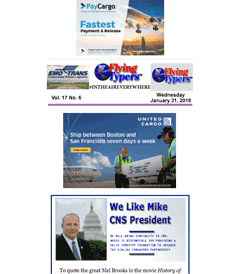

#INTHEAIREVERYWHERE
 |
 #INTHEAIREVERYWHERE |
| Vol. 17 No. 9 | Wednesday
February 14, 2018 |
Trump Effect One Year Later |
As President Trump
enters his second year, it’s time to reflect on the impact of his
policies on the air cargo industry. Value Added America Because of the financial
environment and some advantageous policy changes (most notably sizeable
tax cuts in 2018), businesses—both foreign and domestic—are
saying they see the U.S. as a good place for manufacturing. Now overseas
money is flooding back into the U.S. economy and there appears to be a
bump in domestic investment. Call For Scheduled All Cargo But despite all this
good news, the U.S. is still missing a scheduled all-cargo international
airline able to take on the non-U.S. scheduled freighters. Long gone are
Seaboard World Airlines, Flying Tigers, and North West Orient freighters,
and no U.S. passenger carrier is flying freighters like many of the foreign
airlines do. Looking Into CRAF The Department of Defense maintains that ability through its Civil Reserve Air Fleet (CRAF) program, but it may have trouble doing that much longer. CRAF depends on the integrators’ and non-schedule U.S. airlines freighters (Charter Carriers) for its cargo movements. Since the latter are shifting more and more to long term aircraft leases to protect their profit structure, especially given the risk of increased labor costs (triggered by the shortage of pilots in the U.S.) coupled with an increase in leasing large freighter aircraft (triggered by Amazon’s entry into the market) and the military pallet interoperability issues of the B777 freighters purchased by FedEx, there may develop a problem in the DOD getting sufficient CRAF cargo lift.Pilots In Short Supply The pilot shortage has exacerbated much of this. One cause of the pilot shortage is the FAA requirement for commercial U.S. pilots to hold 1,500 training hours, compared to only 250 hours in most other countries. U.S. carries are busy adjusting the effect of this policy, including large pay increases to its pilots, but a total durable solution will take time without policy changes, putting U.S. carries at a severe disadvantage compared to their foreign airlines competition. This requirement was put into effect for safety reasons, but comparing safety records across countries—as well as U.S. ridership on foreign carriers—it might not make sense to insist on requirements so far out of line with international standards, especially since many believe the policy change was a reaction to an incident that had little or nothing to do with pilot training hours. The Trump Effect On Cargo 2018 What can I predict for the air cargo industry for President Trump’s 2nd year in office? His pledge to improve American infrastructure, including airports, will surely help the airlines. He has also vowed to work on cyber security, effecting “free flight” that will reduce flight time and airline costs, which may potentially enable the large passenger hub and spoke carriers to add an additional bank of flights. Increased disposable income brought about through tax cuts, low unemployment, and salary increases will help more Americans afford vacations and increase consumer spending, boosting passenger volume and increasing demand for door-to-door parcel delivery and inventory management. Increase in domestic manufacturing will also spur demand for schedule airport-to-airport air freight, which will either move in passenger aircraft bellies or on non-U.S. freighters. Air Cargo Step Up & Raise Your Voice The Trump effect
has helped air cargo grow to record levels, but the industry cannot afford
to be complacent. Airlines need to take an active part in developing the
sector and support and encourage the U.S. Government to help solve problems.
Carriers—individually and through industry groups—need to
align their tactical plans to achieve the strategic plan for industry
growth. These are the times when the airlines need to speak with one voice.
To Read Part 1 of This Series, Click Here |
If
You Missed Any Of The Previous 3 Issues Of FlyingTypers Access complete issue by clicking on issue icon or Access specific articles by clicking on article title |
||
 Vol.
17 No. 6 Vol.
17 No. 6We Like Mike CNS President Chuckles for January 31, 2018 2025 On Fruit Logistica Berlin Screen Tightens The Screws Blue Moon Over Darmstadt |
 Vol.
17 No. 7 Vol.
17 No. 7Women In Charge Powering AA Cargo Chuckles for February 5, 2018 Washing My Baby Home |
|
Publisher-Geoffrey
Arend • Managing Editor-Flossie Arend • Film Editor-Ralph Arend • Special Assignments-Sabiha Arend, Emily Arend • Advertising Sales-Judy Miller |
|